Top & Best RFX Software in 2026: Features, Pricing & Reviews
Explore leading RFX solutions that help vendors streamline RFP, RFI, and RFQ responses. See how automation, AI agents, and knowledge hubs boost win rates.

For revenue teams, RFx responses are central to winning business but remain one of the most time-consuming parts of the sales cycle. Hours are lost chasing details across spreadsheets and inboxes, while compliance reviews and last-minute edits stretch teams thin.
The impact shows up in outcomes. G2 reports that high-performing teams win 51 percent or more of their bids, underscoring how efficient RFx management directly influences results.
This guide explores why RFx cycles remain demanding, how technology is reshaping the process, and which solutions to watch in 2026 can help vendors respond faster, more accurately, and with greater consistency.
Strategic Insights to Remember
- RFx responses define revenue outcomes. Teams that manage them well capture more business, while inefficient workflows drag down win rates.
- AI delivers measurable improvements. Faster drafts, fewer errors, and stronger collaboration are no longer optional but essential in competitive markets.
- Platform fit is critical. The best solution depends on your compliance needs, team size, and growth trajectory.
- Collaboration drives success. The most effective tools break down silos between sales, compliance, and solutions teams.
- Early adopters gain an edge. Vendors that modernize RFx management now are better positioned to win consistently against slower competitors.
Complexity in RFx Responses and How AI Solves It
RFx responses involve strict requirements, technical depth, and multiple stakeholders, which makes them harder to manage than most sales activities. This is why many leaders are turning to smarter tools to ease the burden.
In fact, 97% of senior leaders whose organizations are investing in AI report positive ROI, showing that automation is not just a trend but a proven way to handle complex, resource-heavy processes more effectively.
Manual work slows teams down and increases errors. AI simplifies this process by generating first drafts, centralizing knowledge, and identifying risks early, leading to faster, more accurate submissions. Key factors that add complexity include:
- Volume of questions: Many RFx documents include hundreds of detailed requirements, with security and compliance sections alone often exceeding 150 questions.
- Tight deadlines: Buyers expect fast turnaround, leaving little room for long review cycles or scattered content searches.
- Compliance burden: Regulatory requirements demand accurate, up-to-date answers. Any inconsistency can delay approval or disqualify a submission.
- Fragmented content: Teams rely on old spreadsheets, past proposals, or siloed email threads, wasting hours searching for the correct information.
AI-driven platforms help teams address these pain points by:
- Centralizing approved content in a single knowledge hub
- Auto-generating first drafts that reduce manual writing time
- Flagging outdated or conflicting material before it reaches evaluators
- Enabling smoother collaboration across sales, compliance, and technical teams
For CROs and proposal leaders, this means fewer delays, stronger consistency, and a higher chance of meeting deadlines without sacrificing quality. With the need for speed and accuracy clear, the focus turns to which tools deliver.
Also Read: Comprehensive RFP Checklist for Winning Proposals
Comparing the Top 15 Best RFx Software in 2026
The demand for faster and more accurate RFx responses has prompted vendors to adopt platforms that combine automation, AI, and centralized knowledge. These tools are not all created equal. The best solutions strike a balance between speed and compliance, providing teams with visibility across departments and scalability as proposal volumes increase
Here's a comparison table you can refer to, after looking at the various RFx software options available to you:
1. Inventive AI
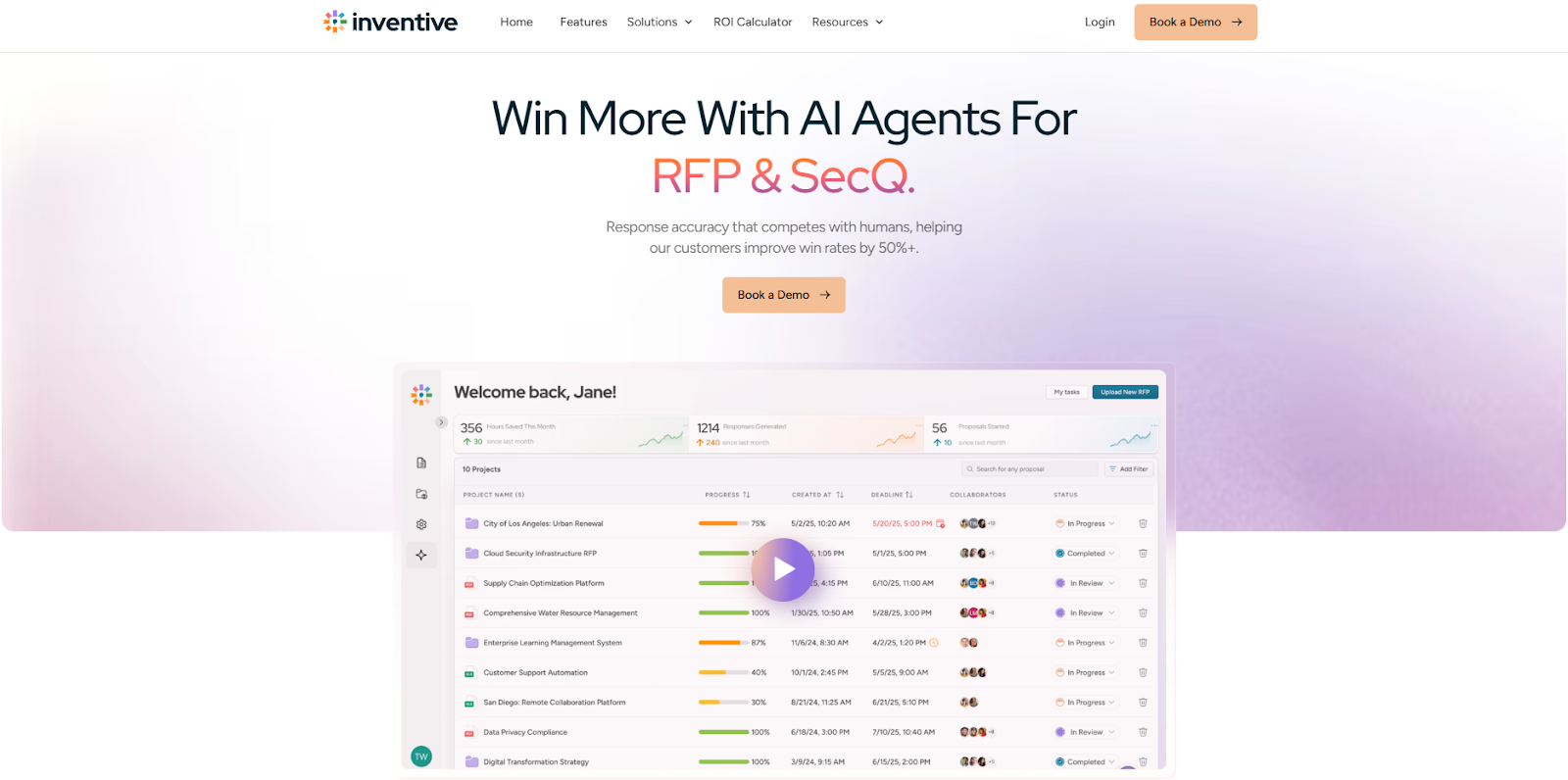
Gartner Rating: 5/5
Inventive AI is leading the market among top RFx software, built specifically for vendors who are tired of chasing answers across scattered docs and outdated spreadsheets. It gives your team a single source of truth, automates high-quality first drafts, and keeps every response aligned with what evaluators care about most.
With best-in-class AI conflict management and the most advanced research agents for competitive and customer insight, Inventive AI helps sales, solutions, and proposal teams deliver polished, evaluator-ready responses at a pace legacy tools simply can’t match.
Key Features
1. AI RFx Agent
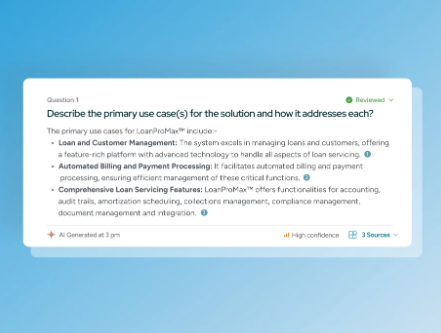
Generates precise first drafts with citations and confidence scores, cutting drafting time by up to 90%.
Benefit: Decision-makers gain faster throughput and higher win rates by freeing teams from manual drafting, accelerating deal cycles without sacrificing accuracy.
2. Knowledge Hub
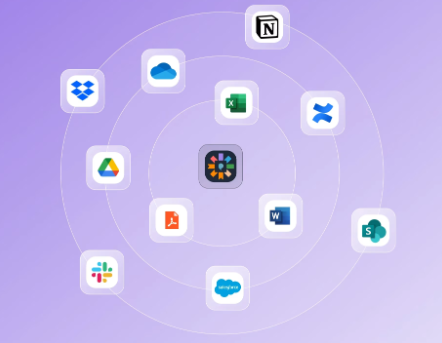
Pulls content from Google Drive, SharePoint, Notion, and CRMs into one searchable source of truth.
Benefit: Leaders reduce wasted hours searching for information, ensuring every response uses the most accurate, approved content, which directly improves evaluator trust and scoring.
3. AI Context Engine
Creates highly contextual responses by drawing from RFPs, web research, and meeting notes.
Benefit: Proposals resonate more with buyers by aligning every response to the deal context, increasing persuasiveness and conversion rates.
4. Content Management
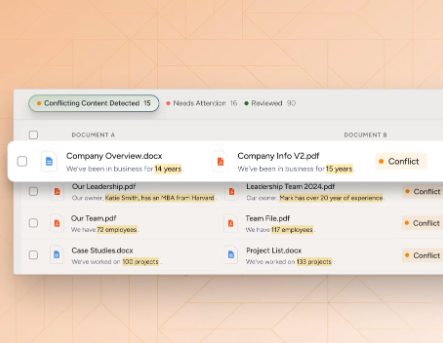
Flags outdated or conflicting content in real time.
Benefit: Executives get consistency and compliance across proposals, reducing legal risk and strengthening credibility with evaluators.
5. Competitor Insights
Competitor research, customer research, and brainstorming agents support win themes and positioning strategies.
Benefit: Teams can differentiate themselves from the competitors more effectively by using AI-driven competitor analysis and customer insights.
This enables teams to uncover unique selling points (USPs), refine their value propositions, and tailor their responses to better highlight how they outperform competitors.
6. Tone & Style Control
Lets RFx teams adapt language, length, and voice to match the buyer or opportunity.
Benefit: Responses can be instantly tailored to each stakeholder, improving evaluator engagement and signaling professionalism.
7. Collaboration Workspace
With Slack integration, role-based permissions, and activity tracking, teams across sales, legal, and compliance work smoothly together.
Benefit: Cross-functional alignment shortens review cycles, eliminates version chaos, and ensures faster, compliant submissions at scale.
Pros:
- Built specifically for vendor teams responding to RFPs, RFIs, and RFQs.
- Eliminates inconsistent or stale answers with AI-powered conflict detection.
- Enhances competitiveness by surfacing differentiators through research agents.
Cons:
- Limited Analytics.
Pricing: Usage-based pricing
Where Inventive AI Shines
Inventive AI is designed with a focus on efficiency, accuracy, and competitive advantage, it stands out by offering capabilities that accelerate proposal workflows while enhancing quality. Here’s where it truly shines:
- 2x Better Response Quality: Produce higher-quality responses in less time. Inventive AI’s automation delivers twice the accuracy, ensuring your team works smarter, not harder.
- Context Engine for Accurate, Tailored Responses: Every response is customized to the deal. The Context Engine pulls insights from RFPs, web research, and meeting notes to create responses that truly resonate with evaluators.
- Instant Conflict Detection: Eliminate inconsistencies in real time. Inventive AI flags any conflicting content, so your proposals remain consistent and compliant.
- Real-Time Outdated Content Detection: Always stay current. Inventive AI automatically detects outdated content and updates responses with the latest, approved information.
- Quality Benchmarking for High-Standard Responses: Responses are automatically compared to gold-standard benchmarks, ensuring they meet the highest quality standards before submission.
- Generate Narrative-Style Proposals: Move beyond bullet points. Inventive AI generates narrative-style proposals that tell a compelling story, engaging evaluators and increasing your chances of winning.
Inventive AI sets the standard for efficient, high-quality RFP responses, giving vendors an advantage that traditional tools simply can’t match.
Best For: CROs, VPs of Sales, and Proposal Managers who need to balance accuracy with speed, especially in industries where accuracy and auditability directly influence win rates.
Customer Feedback:
"Inventive AI helped us cut response time dramatically while keeping every answer aligned with evaluator priorities. Our proposals feel sharper, and evaluators notice." – Verified AR Reviewer.
2. Arphie
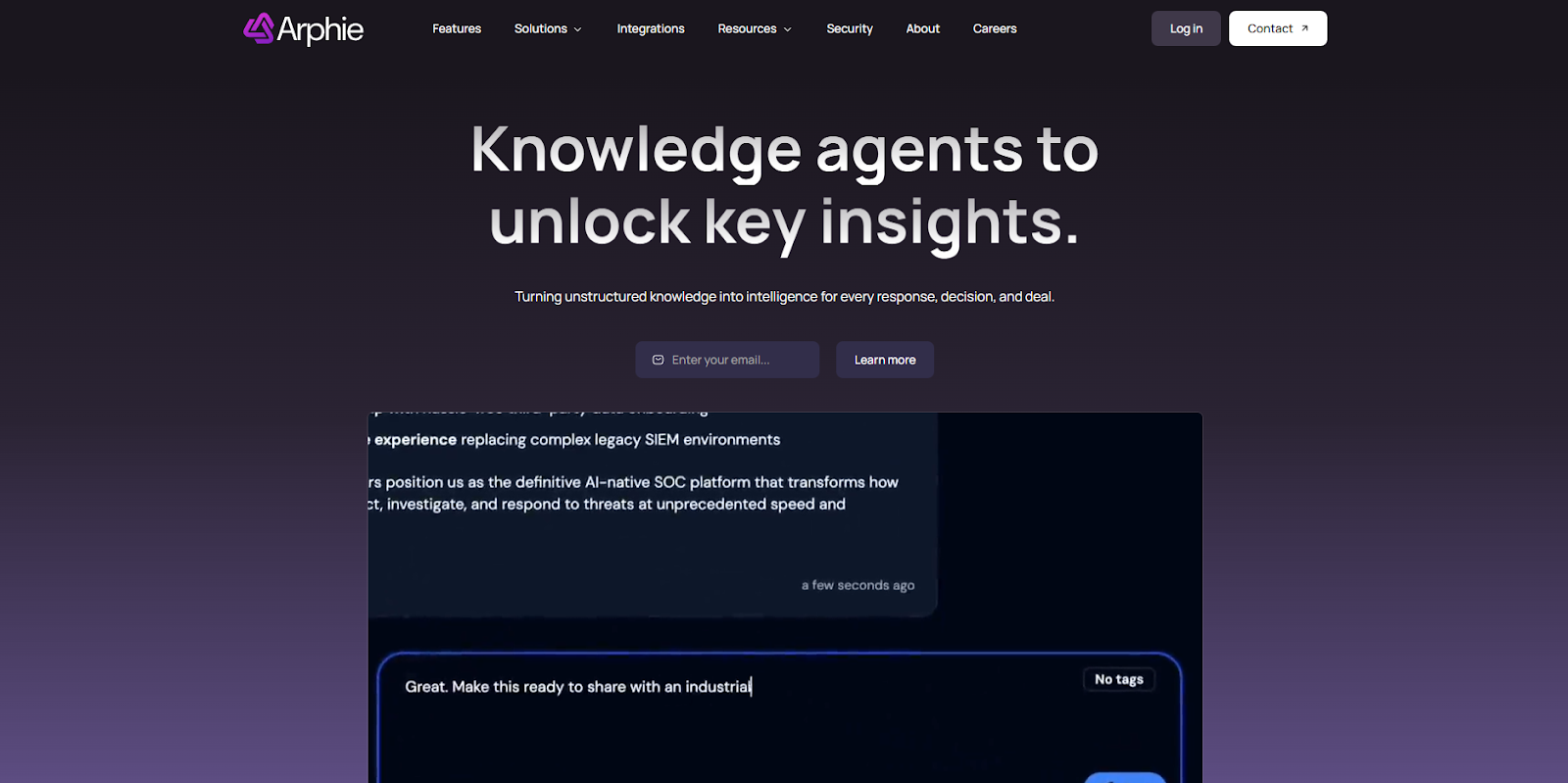
Arphie is a proposal generator built for lean teams that need structured drafts quickly. Its strength lies in speed and accessibility, helping smaller vendors compete in compliance-heavy markets without heavy infrastructure.
Key Features:
- AI-generated first drafts for RFPs and RFIs
- Tailored for lean sales or proposal teams
- Incorporates compliance requirements like HIPAA into drafts
- Designed to help meet tight deadlines
Pros:
- Extremely fast and simple to use
- Ideal for small and mid-sized vendors needing quick turnarounds
Cons:
- Lacks advanced strategic features like win themes
- May not scale for large enterprise volumes
Pricing: Tiered, flexible for startups and mid-sized teams
Best For: Smaller vendors and startups that want to respond professionally to RFx requests without a dedicated proposal team
User Insights:
Teams highlight Arphie’s ease of use and speed, noting it helps them stay competitive even with limited resources.
3. AutoRFP AI
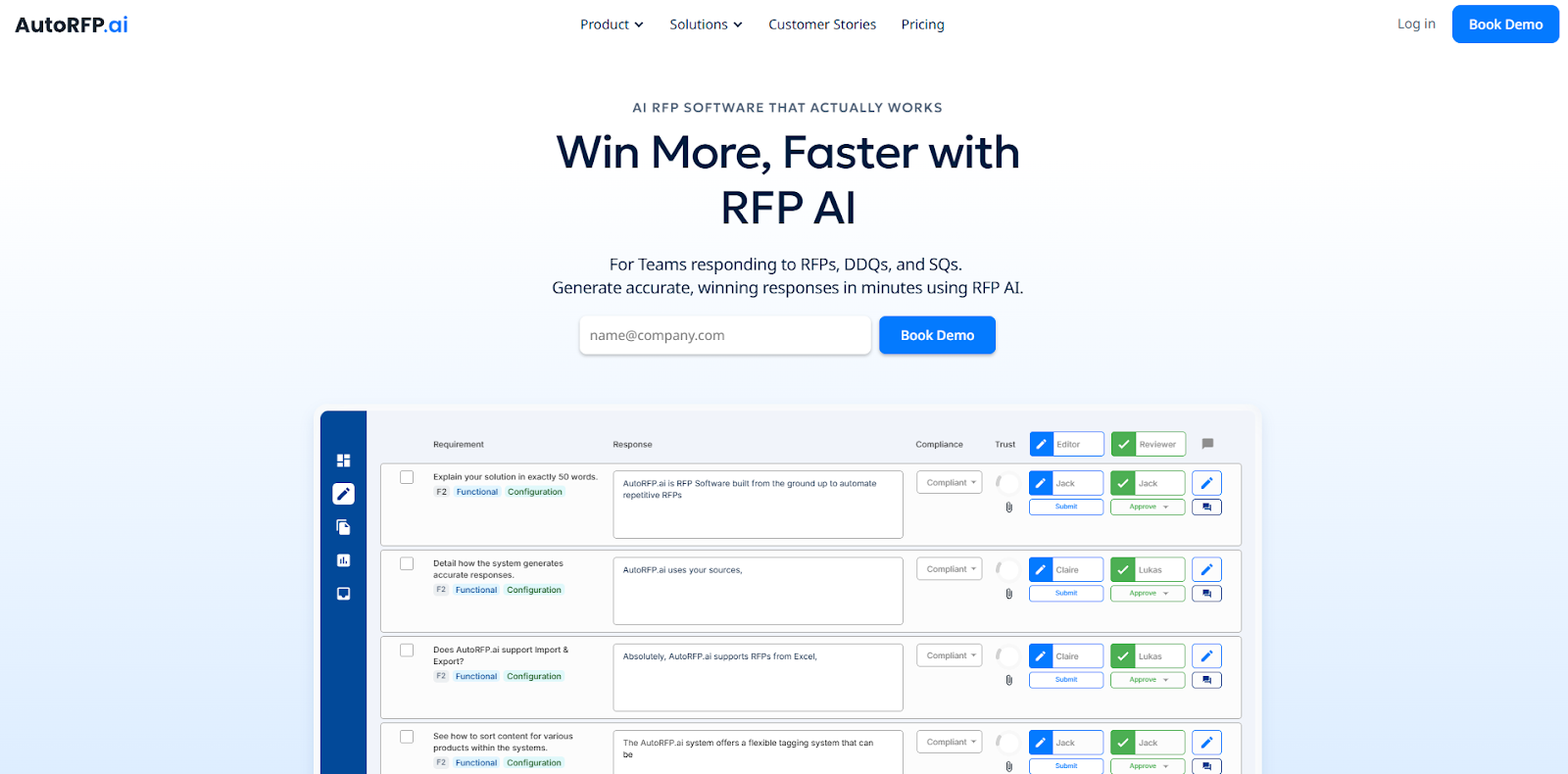
AutoRFP AI focuses on reducing the manual effort of drafting and formatting RFx responses. It is beneficial for payer–provider contracts and compliance-heavy submissions where both accuracy and presentation are critical.
Key Features:
- Automated drafting that generates first responses in minutes
- Formatting support that produces client-ready layouts
- Tailored for complex, compliance-driven agreements
- Collaboration features to bring sales, compliance, and technical teams together
Pros:
- Strong automation for both drafting and formatting
- High accuracy in compliance-focused contracts
Cons:
- Pricing may be steep for small vendors
- Limited customisation compared to legacy platforms
Pricing: $1,000 to $1,450 per month, depending on features
Best For: Mid-sized vendors and providers that need to deliver polished, compliance-ready proposals quickly
User Insights:
Proposal teams note significant time savings on formatting and reduced deadline stress when using Autorfp AI.
4. PandaDoc
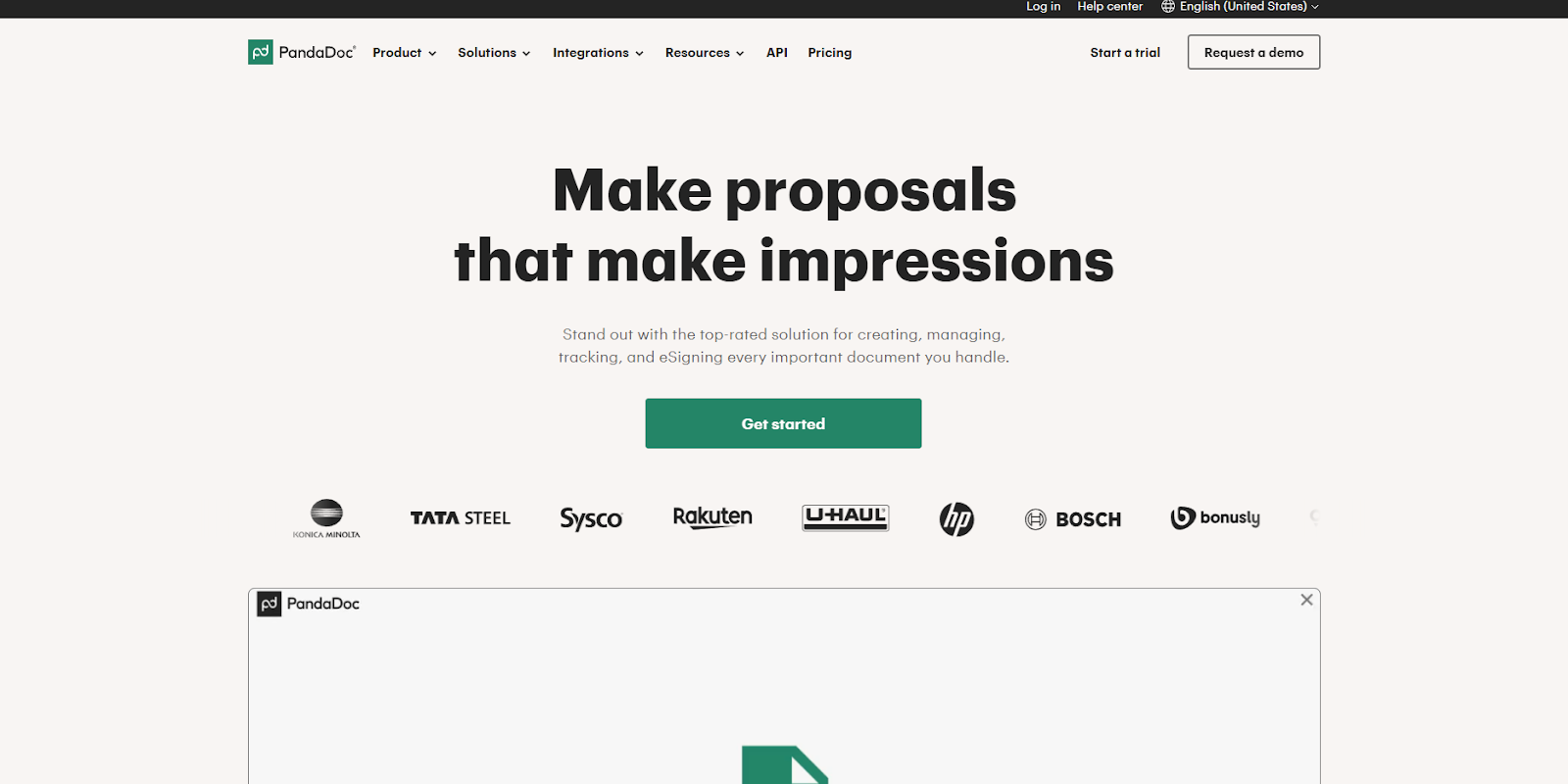
Gartner Rating: 4.0/5
PandaDoc combines proposals, contracts, and e-signatures in a single platform. It is valued by vendors that need a straightforward way to manage both proposals and agreements.
Key Features:
- Unified system for proposals, contracts, and signing
- Compliance-ready templates for healthcare and regulated industries
- E-signature functionality built in
- Template library to reduce repetitive formatting work
Pros:
- Easy to use and quick to adopt
- Combines proposal and contract workflows to speed up deal closure
Cons:
- Less advanced proposal automation features than AI-first platforms
- May not scale as effectively for large enterprises
Pricing: $19 to $65 per user per month
Best For: Vendors and mid-sized providers that need a single system to handle proposals and contracts
User Insights:
Teams report faster contracting cycles and fewer delays after adopting PandaDoc.
5. Loopio
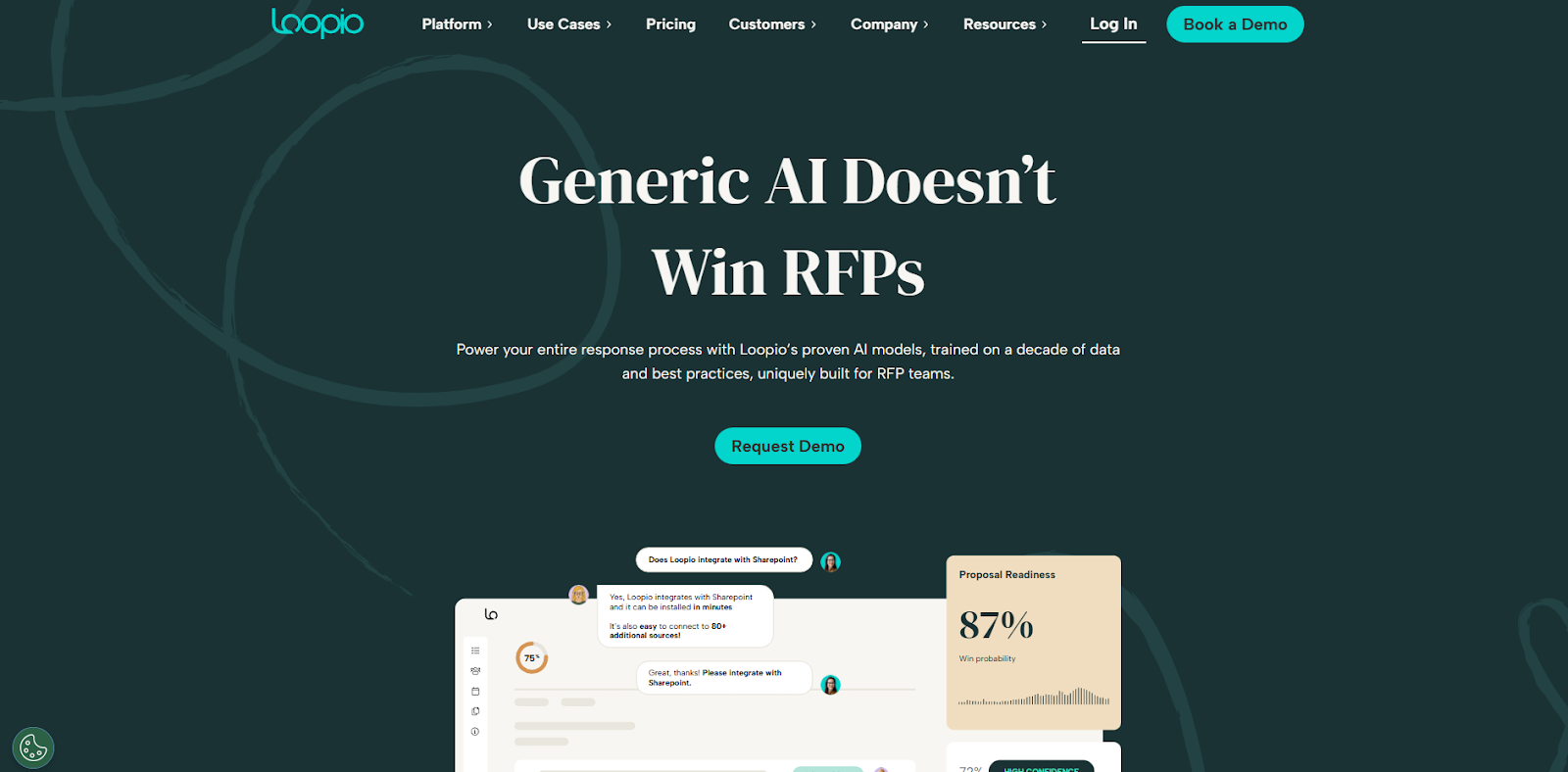
Gartner Rating: 4.5/5
Loopio is widely adopted for its strong content libraries and content reuse capabilities, particularly in compliance-heavy industries. It helps large vendors and enterprises manage recurring RFx responses at scale.
Key Features:
- Centralised content libraries with compliance-approved answers
- Content reuse automation to speed up drafting
- Collaboration support for multiple departments
- Governance and version control for certifications and policies
Pros:
- Proven track record in large enterprises
- Reduces errors through strong library management
- Scales effectively for high response volumes
Cons:
- Requires upfront investment in building libraries
- Custom pricing can be costly for smaller vendors
Pricing: Custom pricing for mid to large organisations
Best For: Enterprises and healthcare systems managing frequent and complex RFx responses
User Insights:
Teams report smoother collaboration and higher consistency after establishing content libraries in Loopio.
6. Proposify
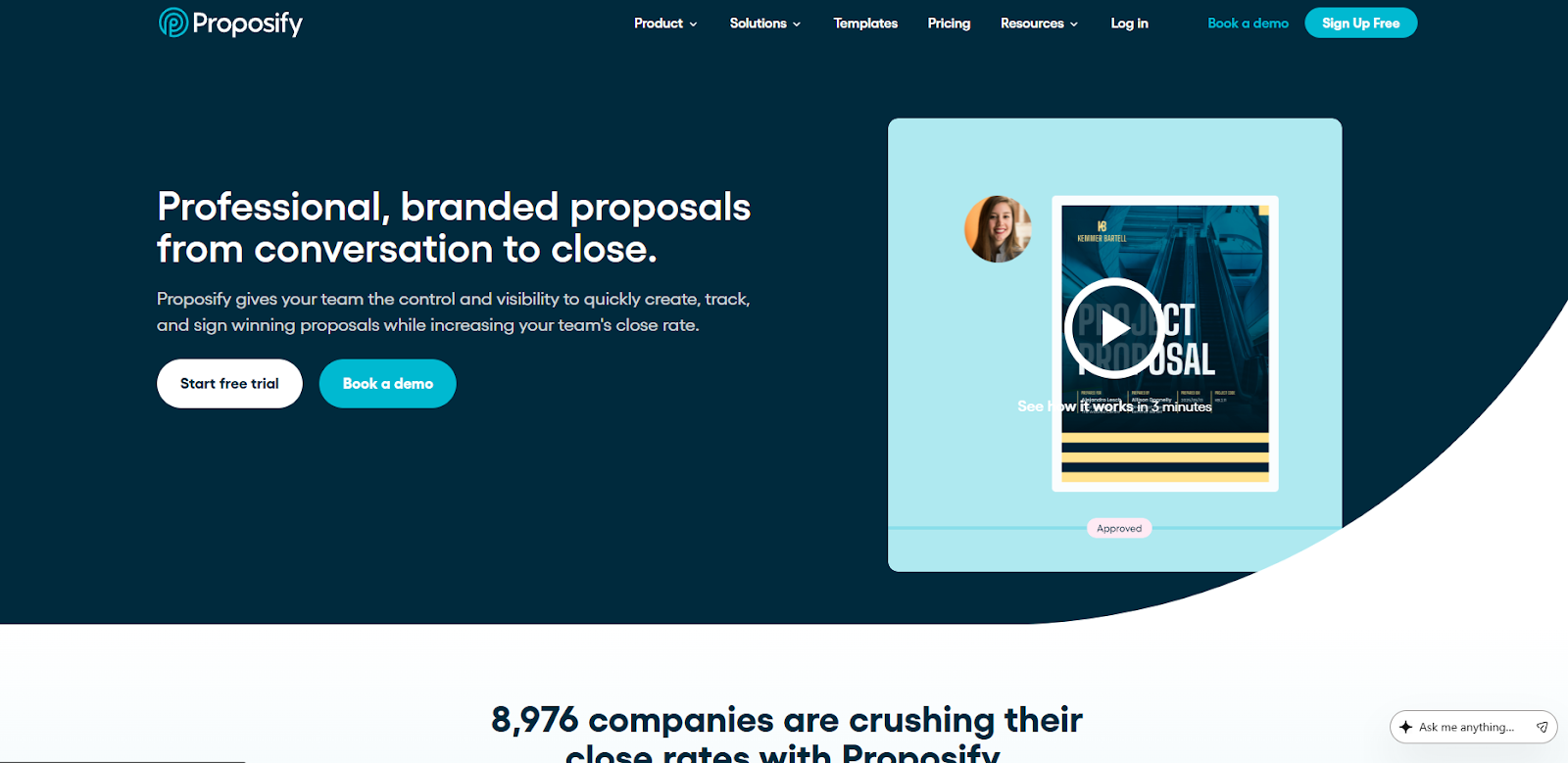
Gartner Rating: 4.3/5
Proposify helps vendors produce visually polished and professional proposals. It is often chosen by smaller teams that want proposals to stand out with a clear presentation.
Key Features:
- Customizable templates tailored for quick proposals
- Automated formatting for consistent, professional layouts
- Collaboration support for sales and compliance teams
- Reusable content library for common sections
Pros:
- Strong focus on presentation and design
- Saves time on repetitive formatting
- Easy for small to mid-sized teams to adopt
Cons:
- Limited compliance management compared to specialized platforms
- Less effective for very large, complex RFx submissions
Pricing: $19 to $65 per user per month
Best For: Small and mid-sized vendors that want to improve the visual quality of their proposals
User Insights:
Users note that Proposify makes proposals look professional with minimal effort, freeing time to focus on content.
7. XaitPorter
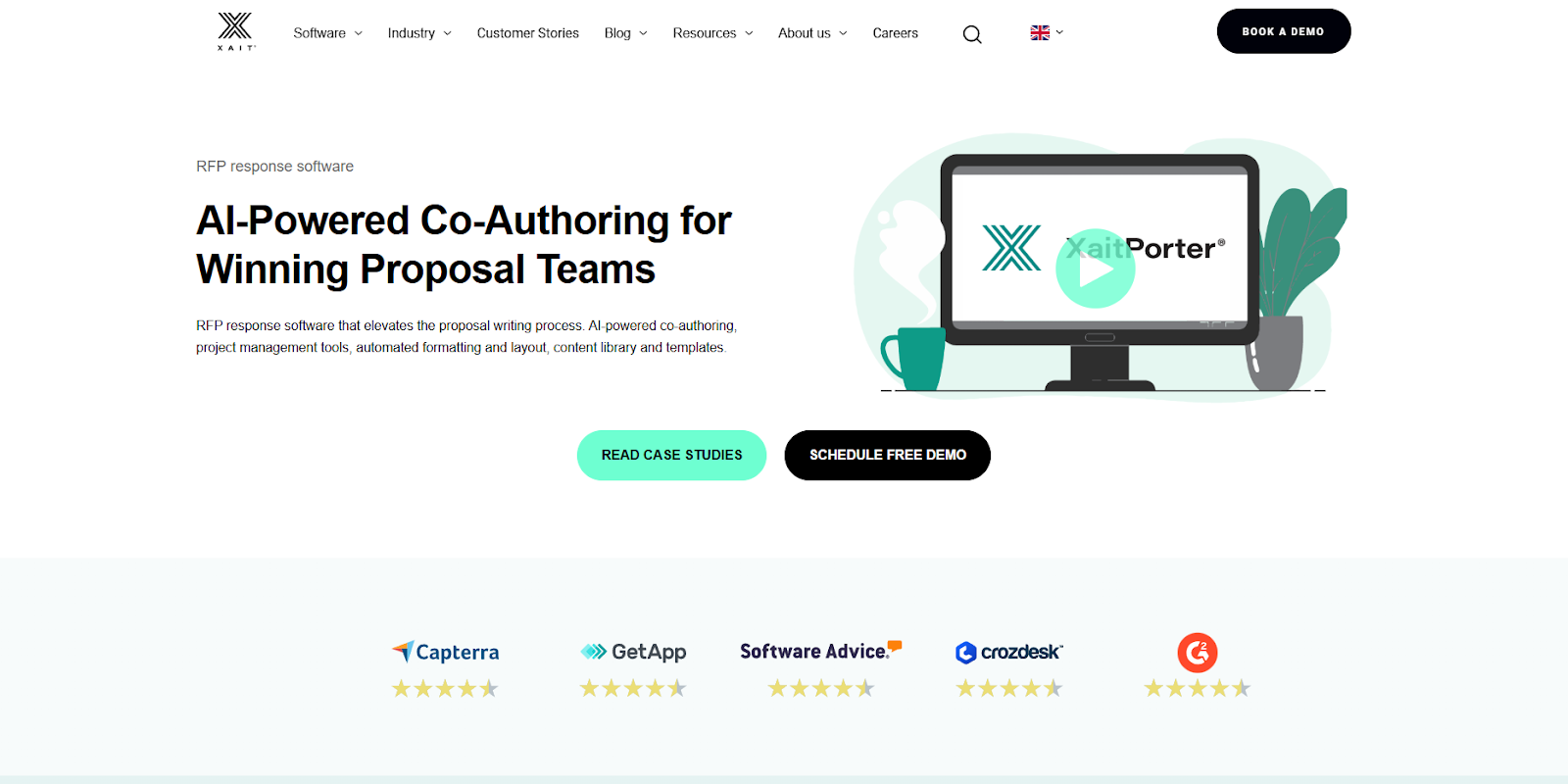
XaitPorter is built around structured co-authoring, making it effective for vendors that need multiple stakeholders to contribute to a single RFx response.
Key Features:
- Structured co-authoring to prevent version conflicts
- Compliance tracking for regulated industries
- Task assignment and monitoring for cross-functional teams
- Audit-ready workflows for review and approval
Pros:
- Excellent for multi-department collaboration
- Strong compliance oversight and transparency
- Eliminates version-control issues that slow down proposals
Cons:
- Less automation compared to AI-native platforms
- Requires alignment of team processes to get full value
Pricing: Custom pricing, often for mid to large enterprises
Best For: Hospitals, payers, and large vendors managing complex responses that involve multiple contributors
User Insights:
Teams highlight smoother collaboration and fewer delays due to XaitPorter’s structured workflows.
8. Sifthub
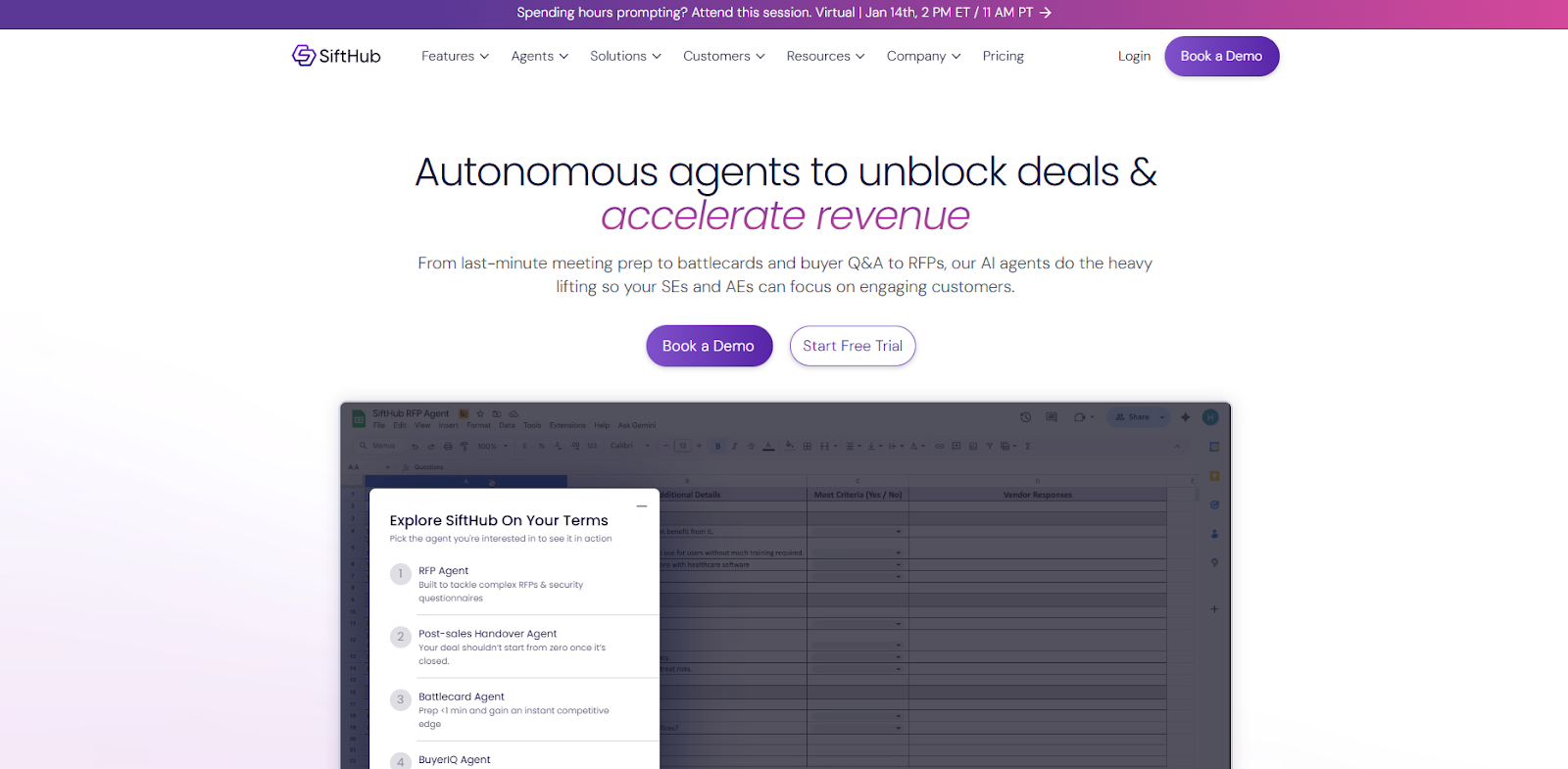
Sifthub is an AI-first platform designed for industries with strict compliance requirements. It emphasizes automation and collaboration, making it a modern option for vendors frustrated with legacy systems.
Key Features:
- Automated drafting for proposal responses
- Compliance-ready workflows built into the platform
- Centralized hub for regulatory and policy documents
- Real-time collaboration across departments
Pros:
- Built with AI as the foundation rather than an add-on
- Improves alignment across sales, compliance, and IT teams
- Reduces bottlenecks from fragmented workflows
Cons:
- Smaller user base compared to older platforms
- May require training for teams new to AI-driven tools
Pricing: Custom pricing depending on features and response volume
Best For: Mid-sized to large vendors needing an AI-native solution for compliance-heavy proposals
User Insights:
Users highlight faster drafting cycles and fewer compliance issues compared to manual approaches.
9. GetAccept
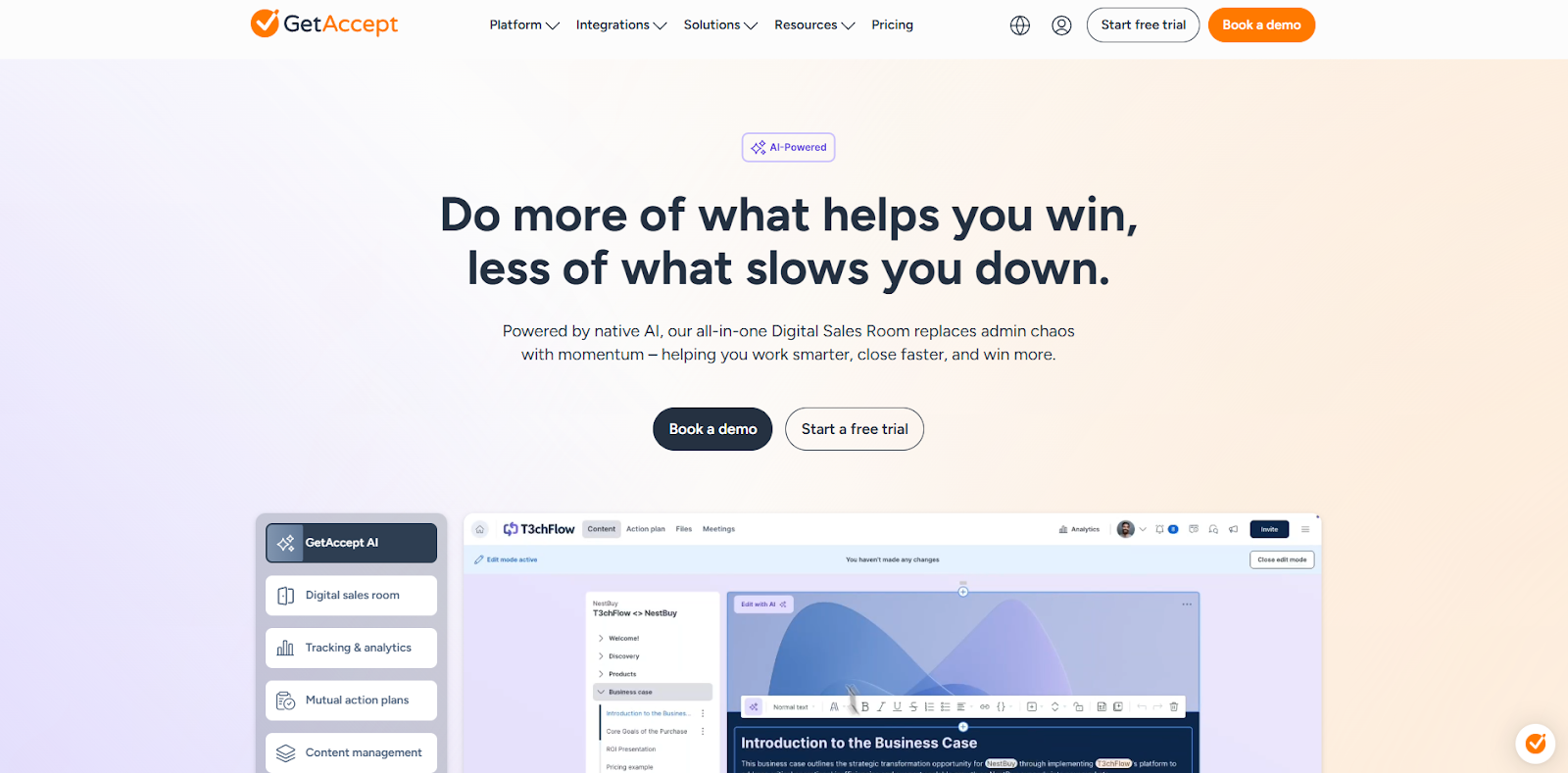
Gartner Rating: 4.4/5
GetAccept combines proposal automation with buyer engagement features, helping teams not only respond but also track how buyers interact with their submissions.
Key Features:
- Proposal creation alongside buyer engagement insights
- Engagement tracking to see what buyers read and focus on
- CRM integrations with Salesforce and HubSpot
- Secure e-signature support
Pros:
- Connects proposal management with sales enablement
- Provides actionable data on buyer behavior
- Speeds up deal closure with integrated signing
Cons:
- Less specialized in compliance-heavy requirements
- May include more sales-focused features than smaller teams need
Pricing: Custom pricing based on team size and feature set
Best For: Vendors who want to combine proposals with buyer engagement intelligence
User Insights:
Teams report better prioritization of follow-ups and more effective conversations after using engagement analytics.
10. QorusDocs
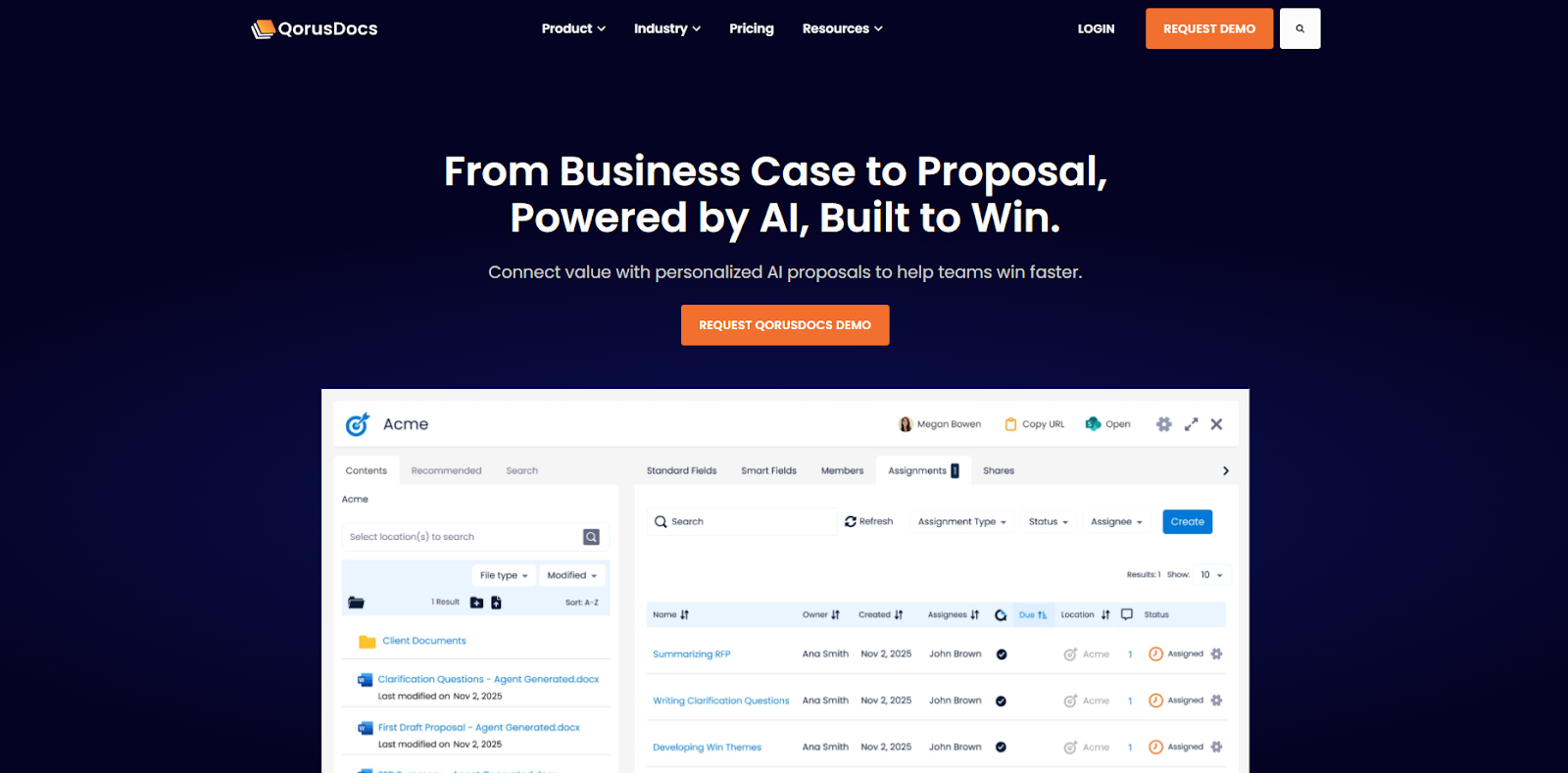
QorusDocs integrates directly with Microsoft Office, making it a good fit for teams already working heavily in Word and PowerPoint.
Key Features:
- Microsoft Office integration for easy drafting
- Innovative content suggestions for compliance-approved answers
- Co-authoring within Office applications
- Content management for healthcare and regulated responses
Pros:
- Easy to adopt due to familiarity with Microsoft tools
- Reduces friction for cross-functional teams
- Suitable for quick content reuse
Cons:
- Less advanced AI automation compared to newer entrants
- Limited scalability for very large RFx volumes
Pricing: Custom pricing depending on integrations and team size
Best For: Vendors that want low learning curves and strong Office integration
User Insights:
Users highlight quick adoption and efficiency gains without significant workflow changes.
11. Qvidian (Upland)
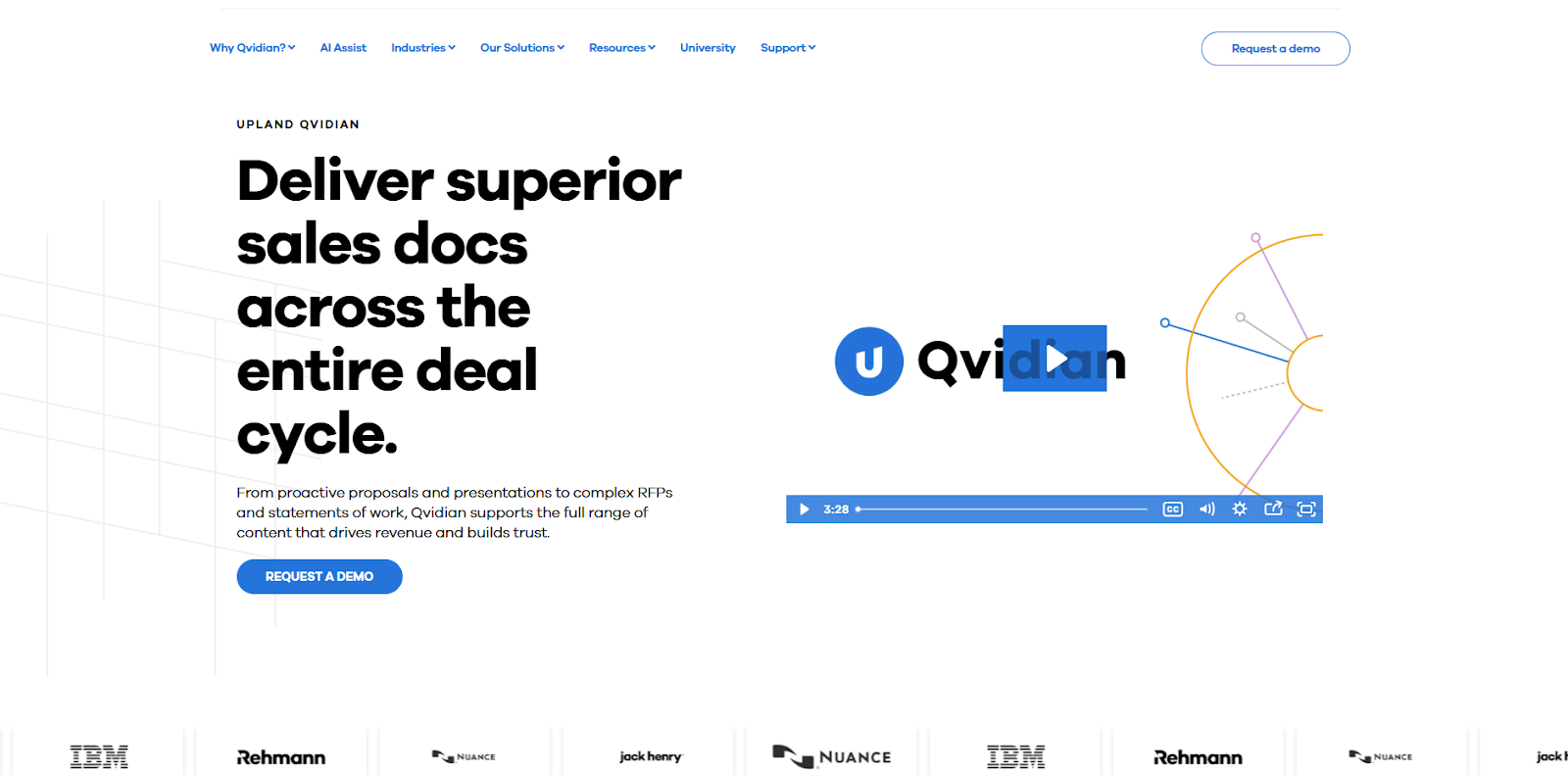
G2 Rating: 4.3/5
Qvidian is a long-standing platform with over four decades of experience. While less AI-driven, it remains popular for structured workflows and template management.
Key Features:
- Template-based workflows for standardized responses
- Centralized content library with version control
- Salesforce CRM integration for workflow alignment
- Audit-ready processes to reduce compliance risks
Pros:
- Proven reliability with large enterprises
- Strong for repetitive, compliance-heavy RFx responses
- Familiar workflows for teams used to templates
Cons:
- Lacks advanced AI capabilities
- Less flexible for fast-changing requirements
Pricing: Custom pricing for enterprise adoption
Best For: Large vendors that prioritize reliability and standardized processes
User Insights:
Teams appreciate its stability and consistency, often using it as a foundation while supplementing with newer tools.
12. Better Proposals
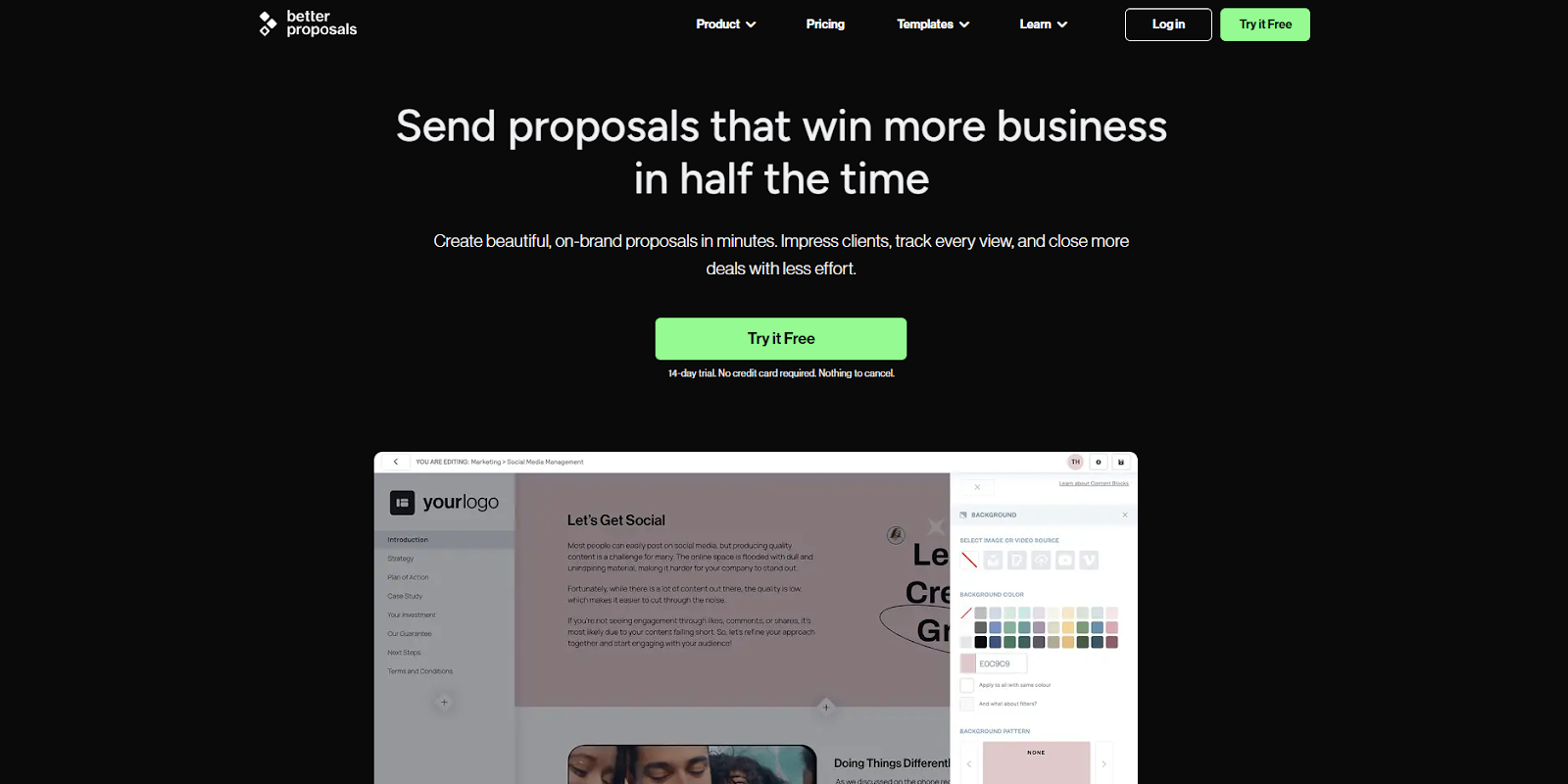
G2 Rating: 4.3/5
Better Proposals is a simple, template-driven tool designed for smaller vendors. Its strength lies in ease of use and affordability.
Key Features:
- Prebuilt AI templates for quick proposal generation
- Built-in e-signature support
- Basic analytics on proposal views
- Affordable pricing plans
Pros:
- Easy to adopt
- Affordable for small teams and startups
- Delivers professional, compliance-ready documents quickly
Cons:
- Limited compliance and conflict detection features
- Not designed for high-volume or complex RFx submissions
Pricing: $19 to $29 per user per month
Best For: Small vendors and startups that need quick, professional responses without heavy investment
User Insights:
Users highlight its simplicity and cost-effectiveness, particularly for smaller RFx cycles.
13. RocketDocs
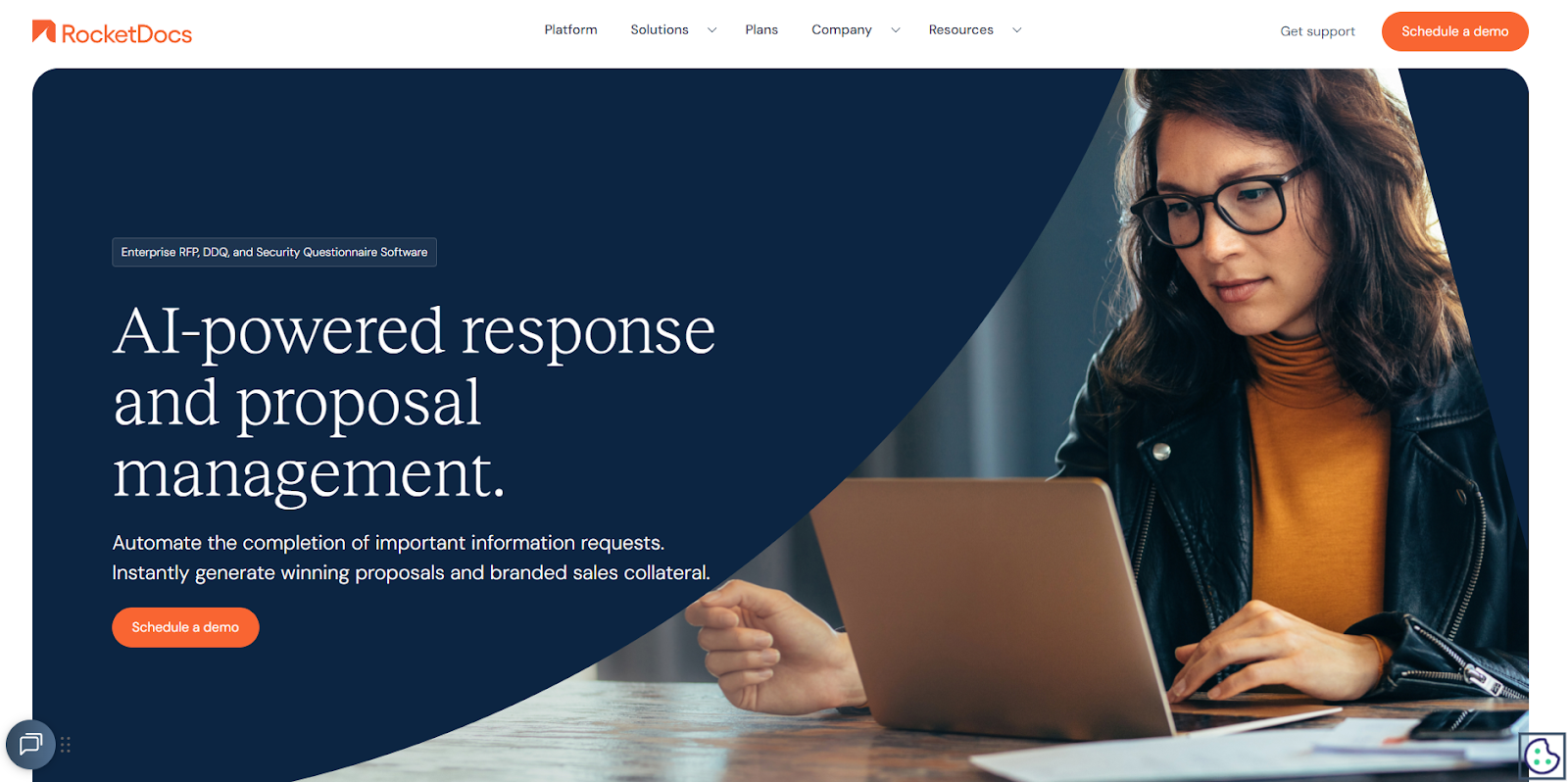
G2 Rating: 4.2/5
RocketDocs is designed with a focus on privacy and security, making it a good fit for vendors handling sensitive or regulated data. Its emphasis is on secure automation and centralized content.
Key Features:
- Private AI for secure proposal drafting
- Centralized content hub for compliance documents
- Collaboration tools for sales, IT, and compliance teams
- Integrations with CRMs and document systems
Pros:
- Strong security-first design
- Reduces risk of exposing confidential information
- Simplifies compliance-heavy proposals
Cons:
- Lower G2 rating compared to peers
- Interface may feel dated to some users
Pricing: Custom pricing tailored to enterprise needs
Best For: Vendors requiring strict data security while automating proposal responses
User Insights:
Users value RocketDocs’ privacy-first approach when dealing with sensitive compliance content.
14. Responsive
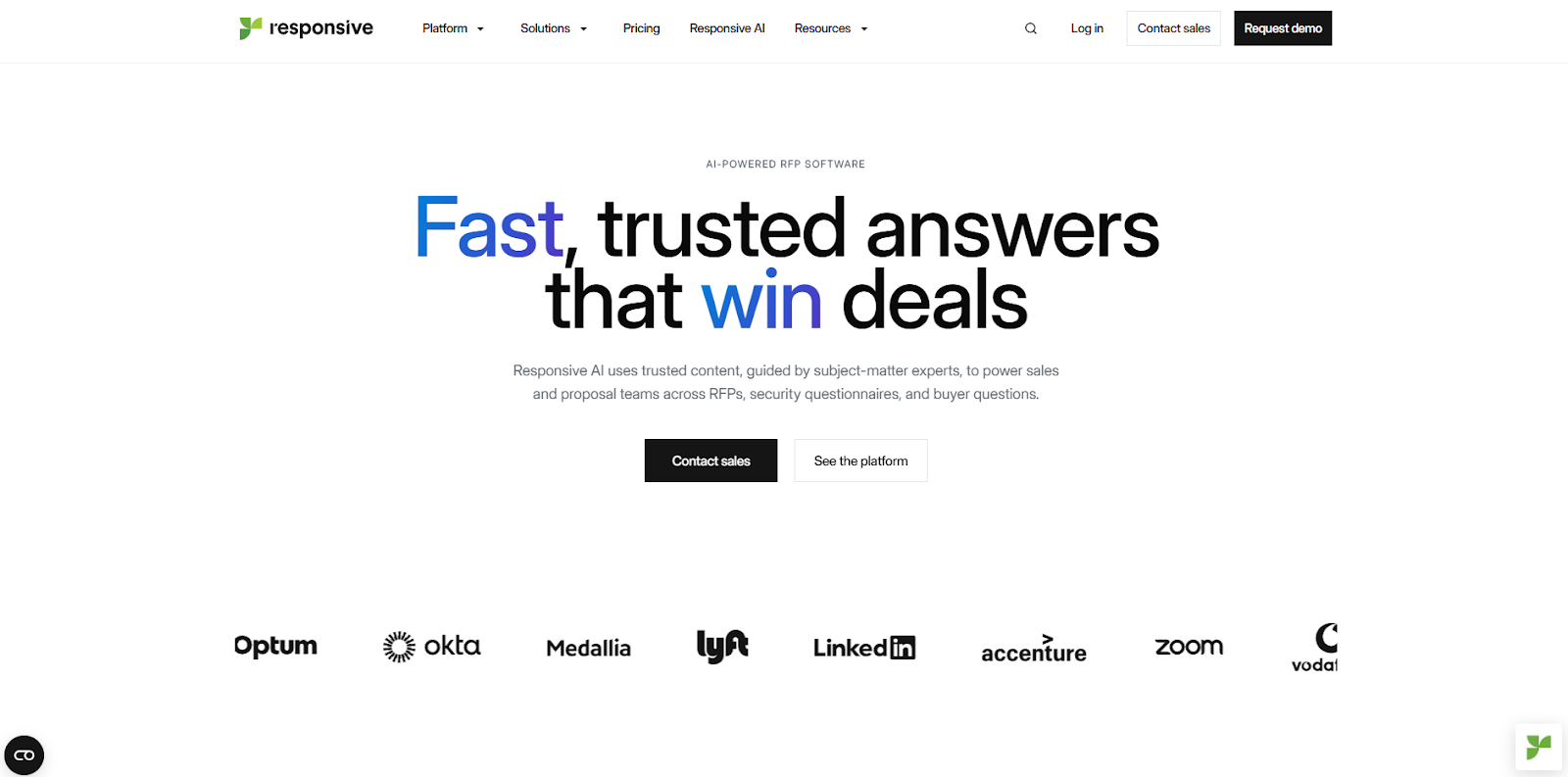
G2 Rating: 4.5/5
Responsive, formerly RFPIO, is a collaboration-focused platform that supports large teams working on complex RFx responses. Its strength lies in multi-department coordination and strong integrations.
Key Features:
- AI-powered search for past responses
- Collaboration at scale across compliance, IT, and sales teams
- Integrations with Salesforce, Slack, and Microsoft Teams
- Analytics dashboards for visibility on progress and deadlines
Pros:
- Improves cross-department collaboration
- Strong integration with enterprise systems
- Enhances visibility and oversight in complex projects
Cons:
- Less specialized for compliance-heavy industries
- Can feel overwhelming for smaller teams
Pricing: Custom pricing depending on team size and proposal volume
Best For: Hospitals, insurers, and large vendors that need visibility and coordination across departments
User Insights:
Users report fewer duplicated efforts and smoother handoffs between teams.
15. BidSketch
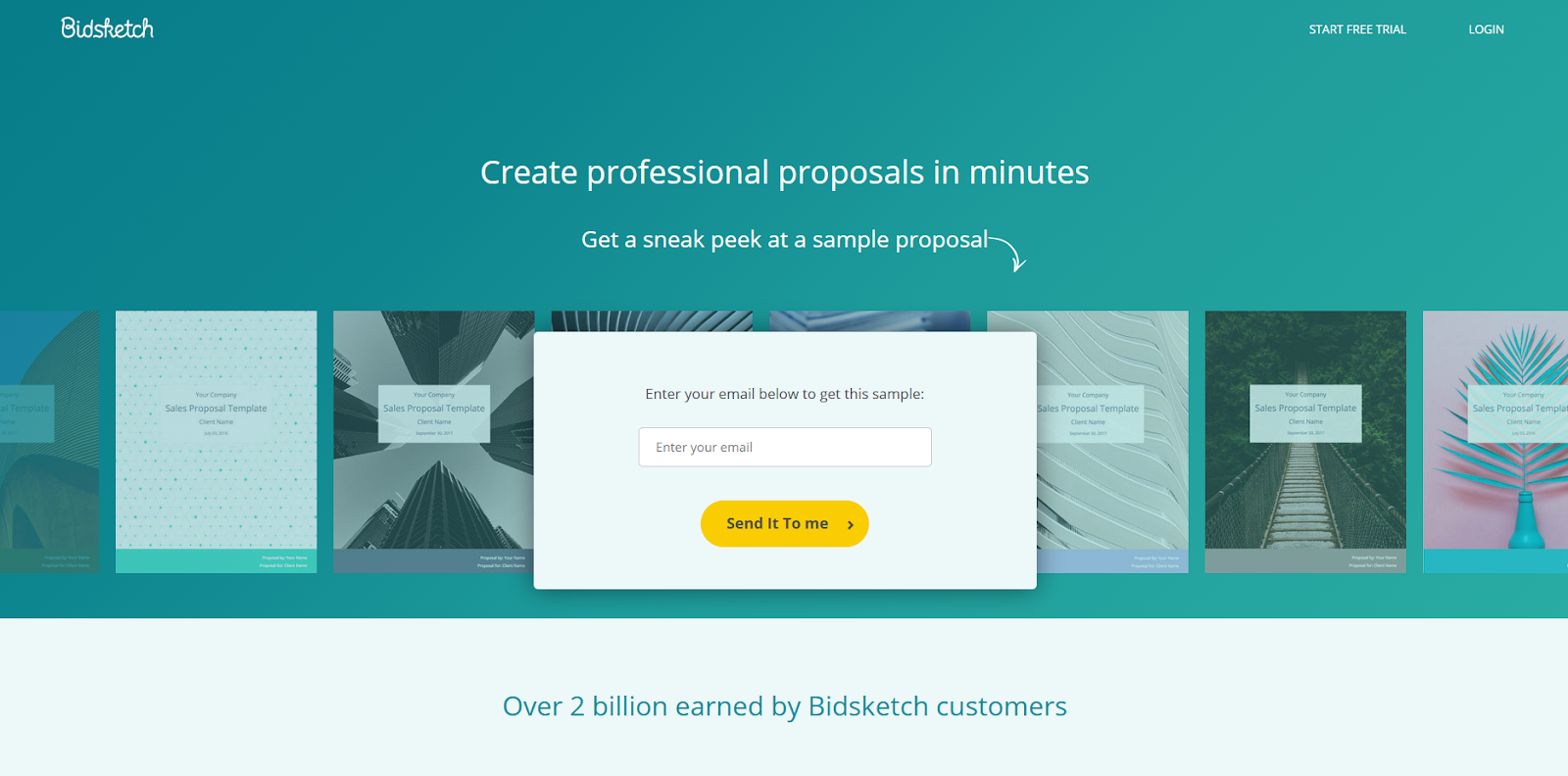
G2 Rating: 3.6/5
BidSketch is a budget-friendly proposal tool designed for consultants and small vendors. It focuses on affordability and structured templates rather than advanced AI features.
Key Features:
- Structured templates for clean, professional proposals
- Basic analytics on proposal views
- AI-assisted formatting for consistency
- Low-cost entry point for small vendors
Pros:
- Very affordable option for small teams
- Easy to set up and use quickly
- Maintains a professional look and structure
Cons:
- Limited advanced automation or compliance oversight
- Not suitable for high-volume or complex RFx cycles
Pricing: $29 to $149 per month, depending on plan
Best For: Consultants and small vendors who need professional proposals at a low cost
User Insights:
Users see it as a simple, budget-friendly solution that provides enough structure for professional-looking proposals without heavy investment.
How AI is Transforming RFx Responses?
Managing RFx cycles has always been one of the most resource-intensive parts of the sales process. Large volumes of technical questions, compliance checks, and cross-department contributions often stretch teams to their limits.
AI is now changing how these challenges are approached by embedding automation and intelligence directly into the response process.
Where AI makes the most significant difference?
- Faster Turnaround: Automated drafting reduces the time spent creating first responses from days to hours, allowing teams to meet aggressive deadlines more consistently.
- Improved Accuracy: AI tools identify outdated or conflicting content before it reaches evaluators, helping vendors maintain compliance and credibility.
- Contextual Responses: Modern engines factor in data from CRMs, meeting notes, and opportunity details to generate answers tailored to the buyer’s priorities.
- Collaboration at Scale: AI-enabled workspaces simplify contributions from sales, compliance, IT, and legal, reducing friction and version-control issues.
- Data-Driven Strategy: Built-in analytics highlight trends in evaluator scoring and response performance, giving leaders clearer visibility into what drives wins.
AI in RFx response management is less about replacing human expertise and more about removing bottlenecks that slow teams down. The result is a process that is faster, more consistent, and better aligned with what evaluators use to make decisions.
Also Read: How to Use AI for Proposal Writing
How to Choose the Right RFx Solution for Your Team?
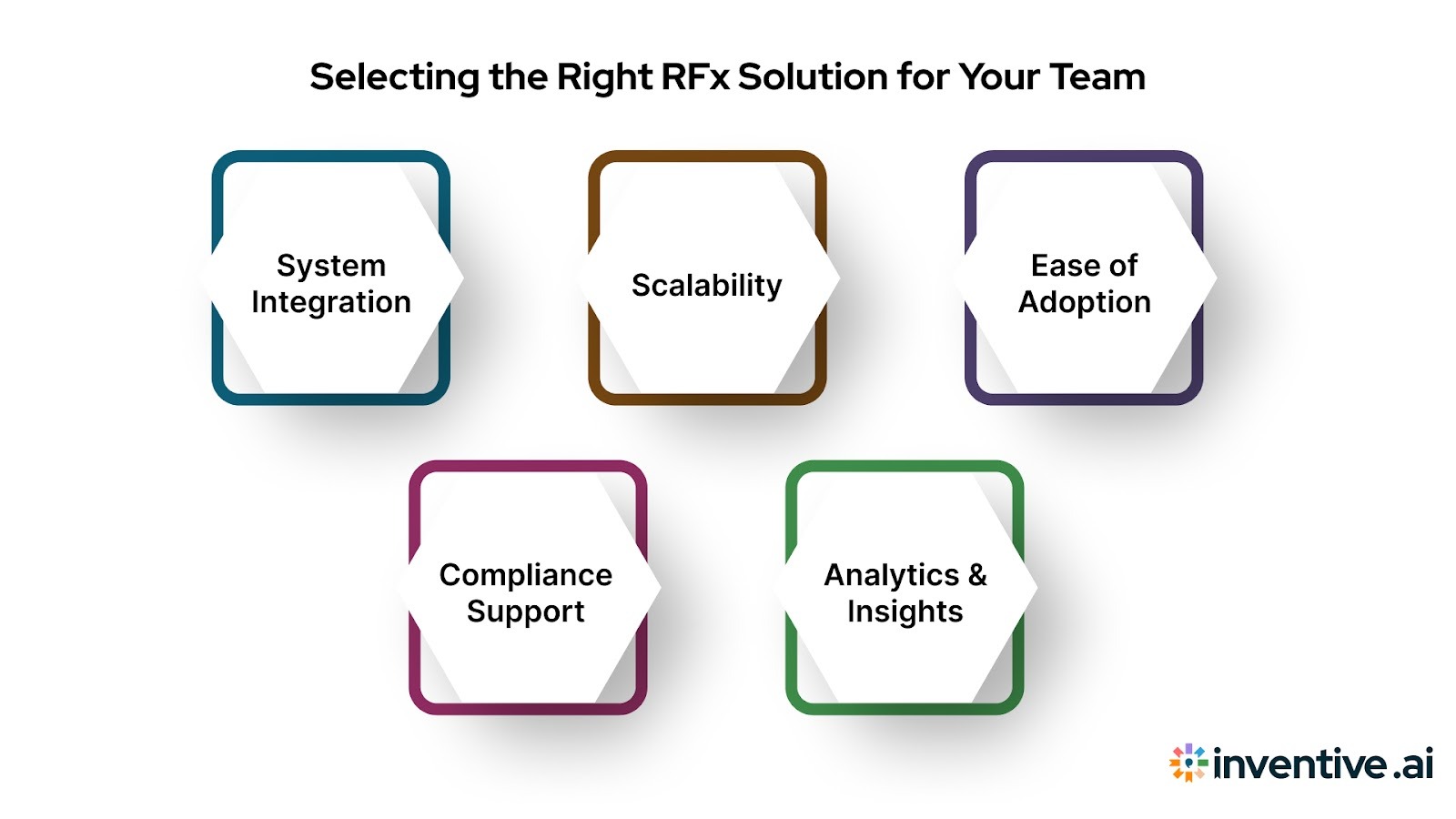
With so many platforms available, selecting the right RFx solution comes down to understanding your team’s priorities, workload, and compliance needs. A good fit balances automation with usability, while ensuring the platform integrates into existing workflows.
Factors to consider when evaluating RFx tools:
- Integration with Existing Systems: Look for platforms that connect with CRMs, content repositories, and document systems your teams already use. Smooth integration reduces disruption and accelerates adoption.
- Scalability: Consider whether the solution can handle your current volume of RFx responses and scale as the number of bids grows.
- Ease of Adoption: The best tools are those your teams will actually use. Intuitive interfaces, in-app guidance, and low training requirements are critical.
- Compliance Support: For industries with strict regulations, features like version control, content governance, and audit-ready reporting are essential.
- Analytics and Insights: Beyond drafting, strong solutions provide visibility into response performance, deadlines, and evaluator alignment.
For CROs, VPs of Sales, and proposal leaders, the right RFx platform is one that not only speeds up responses but also strengthens consistency and increases win rates. The decision should focus on long-term business impact rather than short-term convenience.
Accelerate Your Revenue Momentum with Inventive AI
RFx responses are no longer just about getting proposals out the door. They are now a core driver of revenue, shaping how evaluators view your organization and whether deals move forward.
The growing pressure of compliance requirements, complex scoring models, and shortened timelines makes it clear that traditional, manual approaches cannot keep up.
Modern platforms show that automation and AI can transform this process. By producing faster drafts, reducing errors, and unifying collaboration across sales, compliance, and solutions teams, these tools are helping vendors work smarter and compete more effectively.
For leaders responsible for revenue growth, the decision is not whether to adopt more intelligent RFx workflows, but how quickly to make the shift. Teams that act now position themselves to win more consistently and capture opportunities that slower competitors miss.
Frequently Asked Questions
1. Why are RFx responses so resource-intensive?
Because they combine technical depth, compliance requirements, and contributions from multiple departments, RFx responses demand more time and coordination than typical sales activities. Manual processes often make this worse.
2. How does AI improve the RFx process?
AI reduces manual drafting, flags outdated or conflicting answers, centralizes knowledge, and helps teams generate evaluator-ready responses in a fraction of the time.
3. Are these platforms only useful for large enterprises?
No. While some tools are enterprise-focused, many platforms support small and mid-sized vendors that need faster, more accurate responses without building a large proposal team.
4. What features matter most when choosing an RFx solution?
Integration with existing systems, compliance support, scalability, ease of adoption, and analytics should guide your decision. The right mix depends on your industry and team size.
5. How do RFx tools impact win rates?
Teams that use proposal automation and AI-driven platforms see measurable improvements. High-performing teams win more than half of their bids, often because their responses are consistent, compliant, and closely aligned with evaluator priorities.

90% Faster RFPs. 50% More Wins. Watch a 2-Minute Demo.
Recognizing that complex RFPs demand deep technical context rather than just simple keyword matching, Vishakh co-founded Inventive AI to build a smarter, safer "RFP brain." A published author and researcher in deep learning from Stanford, he applies rigorous engineering standards to ensure that every automated response is not only instant but factually accurate and secure.
After witnessing the gap between generic AI models and the high precision required for business proposals, Gaurav co-founded Inventive AI to bring true intelligence to the RFP process. An IIT Roorkee graduate with deep expertise in building Large Language Models (LLMs), he focuses on ensuring product teams spend less time on repetitive technical questionnaires and more time on innovation.


